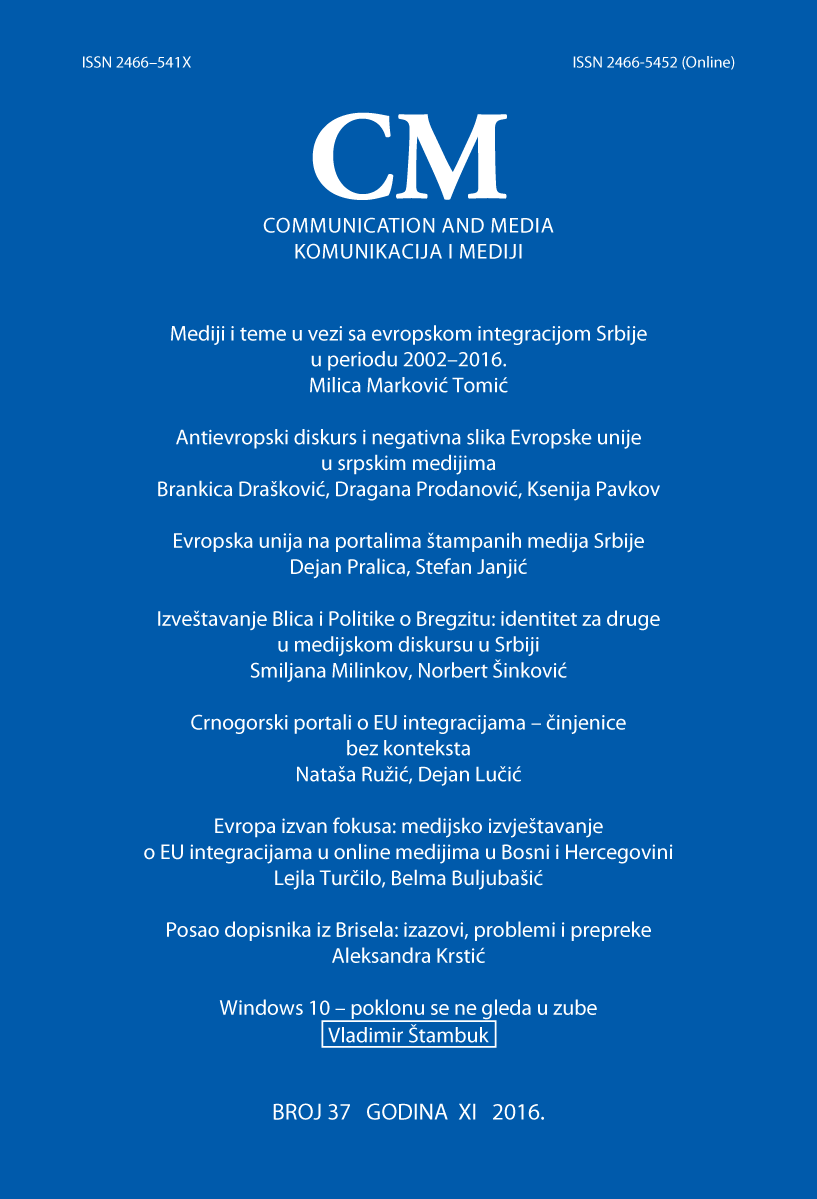MEDIA AND TOPICS RELATED TO EUROPEAN INTEGRATION OF SERBIA FOR THE PERIOD 2002-2016
Abstract
European integration of Serbia is defined as a long-term strategic goal of all Serbian governments, from 2002 to mid-2016, when the paper was written. To achieve this goal, Serbian politicians and experts emphasize the importance of public support and understanding of the EU integration among the Serbian citizens. Theory and practice, however, confirm the fact that it is very difficult to pass the unified message with unchanged meaning about the topic of such a strong public interest such is the topic European integration. Many communicators use various channels to convey the message of the European road, which again, provokes positive and negative attitudes, and even indifference among Serbian public. The views of Serbian citizens regarding joining the EU, monitored and measured through regular semi-annual public opinion polls, have evolved, from percentage of 72% of respondents who support to joining the EU at the end of 2002 to 41% in July 2016. The goal of this paper is to try to answer some of the questions related to formation and change of the attitudes of citizens of Serbia towards European integration, questions related communication process and communication actors, in an impartial manner and taking into account theory and official data, analysis of all actors involved in the process of informing the public on European issues, their messages and actions. This paper provides an analysis of the state of the European idea in Serbia. It uses the broader, more complete definition of the media, which encompasses all stages and actors in communication. Particular attention is paid to the analysis of the current state of the EU themes in Serbia, covering various aspects of the communication process, communication potentials in Serbia with segmentation of special communication actors and publics, as well as the obstacles and challenges in the context of communication of this topic.
References
BBC World Service Trust (2010). Kako to utiče na nas? Pokrivenost tema u oblasti evropskih integracija u srpskim medijima. Analiza medija za potrebe Delegacije EU u Srbiji.
BBC Media Action (2012). Coverege of the EU and EU Integration in the Serbian Media. Analiza medija za potrebe Delegacije EU u Srbiji.
European Commision (2014). Public Opinion in the European Union. Posećeno 30. 10. 2016. URL: http://ec.europa.eu/public_opinion/archives/eb/eb81/eb81_publ_en.pdf.
Informacioni sistem za koordinaciju razvojne pomoći u Republici Srbiji (2016). Posećeno 30. 10. 2016. URL: http://www.evropa.gov.rs/Evropa/PublicSite/index.aspx.
Kancelarije Vlade Republike Srbije za evropske integracije (2016a). Evropska orijentacija građana Srbije. Posećeno 30. 10. 2016. URL: http://www.seio.gov.rs/dokumenta/nacionalna-dokumenta.200.html.
Kancelarija Vlade Republike Srbije za evropske integracije (2016b). Istraživanje javnog mnjenja. Posećeno 30. 10. 2016. URL: http://www.seio.gov.rs/dokumenta/nacionalna-dokumenta.200.html.
Mihailović, S. Ružica, M. Jakobi, T. Jašović, B. Jandrić, M. Zajić, G. Vasović, M. Stojiljković, Z. Mihailović, V. & Torbica, D. (2015). Od novinara do nadničara. Pekarni rad i život. Beograd: Fond za otvoreno društvo, Centar za razvoj sindikalizma.
Radojković, M. & Đorđević, T. (2005). Osnovi komunikologije. Beograd: Fakultet političkih nauka.
Radojković, M. & Miletić, M. (2008). Komuniciranje, mediji i društvo. Beograd: Učiteljski fakultet.
Radojković, M. & Stojković, B. (2009). Informaciono komunikacioni sistemi, Drugo izdanje. Beograd: Clio.
Strategija komunikacije o pristupanje Republike Srbije Evropskoj uniji. (2012). Beograd: Kancelarija za evropske integracije Vlade Republike Srbije. Posećeno 30. 10. 2016. URL: http://www.seio.gov.rs/upload/documents/nacionalna_dokumenta/strategija_komunikacije_2011.pdf.
Strategija komunikacije o IPA. (2013). Beograd: Kancelarija za evropske integracije Vlade Republike Srbije.
Copyright
Authors retain copyright of the published papers and grant to the publisher the non-exclusive right to publish the article, to be cited as its original publisher in case of reuse, and to distribute it in all forms and media.
Licensing
The published articles will be distributed under the Creative Commons Attribution ShareAlike 4.0 International license (CC BY-SA). It is allowed to copy and redistribute the material in any medium or format, and remix, transform, and build upon it for any purpose, even commercially, as long as appropriate credit is given to the original author(s), a link to the license is provided, it is indicated if changes were made and the new work is distributed under the same license as the original.
Users are required to provide full bibliographic description of the original publication (authors, article title, journal title, volume, issue, pages), as well as its DOI code. In electronic publishing, users are also required to link the content with both the original article published in CM: Communication and Media and the licence used.
Authors are able to enter into separate, additional contractual arrangements for the non-exclusive distribution of the journal's published version of the work (e.g., post it to an institutional repository or publish it in a book), with an acknowledgement of its initial publication in this journal.
Self-archiving policy
Authors are permitted to deposit author’s publisher's version (PDF) of their work in an institutional repository, subject-based repository, author's personal website (including social networking sites, such as ResearchGate, Academia.edu, etc.), at any time after publication.
Full bibliographic information (authors, article title, journal title, volume, issue, pages) about the original publication must be provided and links must be made to the article's DOI and the license.
Disclaimer
The views expressed in the published works do not express the views of the Editors and the Editorial Staff. The authors take legal and moral responsibility for the ideas expressed in the articles. Publisher shall have no liability in the event of issuance of any claims for damages. The Publisher will not be held legally responsible should there be any claims for compensation.

